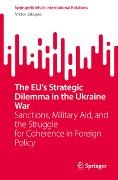Read more
List of contents
Chapter 1. The Paradox of Sanctions and the EU’s Strategic Dilemma.- Chapter 2. EU Sanctions and the Russo-Ukraine War: Strategies and Repercussions.- Chapter 3. EU’s Rescue Plan: Fragmented Support and the Coalition of the Willing.- Chapter 4. Marginalising the EU: Trump’s Diplomacy and the EU’s Strategic Failure.- Chapter 5. EU’s Existential Crisis: A Self-Inflicted Decline.- Chapter 6. EU Unity, Fragmentation and its Future in the Russo-Ukraine War.- Chapter 7. Epilogue: Diplomatic, Political and Economic Dissonance: Europe on the Sidelines.
About the author
Viktor Jakupec is an Honorary Professor in Development Studies at Deakin University, Australia, and the Faculty of Economics and Social Sciences at Potsdam University, Germany. He held academic positions at universities in Asia and Africa. His research focuses on political economy analysis, development studies, and foreign aid. As a consultant, he advised governments and multi-lateral aid agencies such as the World Bank, Asian Development Bank, International Finance Corporation, European Commission, and numerous bilateral aid agencies in over 14 Asian, MENA, South Pacific, and European countries. Jakupec holds a Dr. phil. from FU Hagen, Germany, and a Dr. habil. from Giessen University, Germany. His recent publications include Jakupec, V. (2024) The West's Response to the Ukraine War, Cham: Springer; and Jakupec, V., Kelly, M. and McKay, J. (2024). Foreign Aid in a World in Crisis, London / New York: Routledge.
Summary
As the war in Ukraine enters its fourth year, this book critically examines the strategies employed by the European Union (EU) and the United States (US) in their support of Ukraine. It examines how sanctions, military aid, and diplomacy have shaped the conflict and considers whether these efforts are falling short. Through political, economic, and strategic analysis, it explores the EU’s internal divisions, the changing role of US leadership under a second Trump administration, and the increasing risk of Ukraine being marginalised in global negotiations. The author questions whether the EU’s reliance on sanctions and fragmented military support has weakened its own position more than that of Russia. Providing a realist perspective on the war’s broader geopolitical consequences and the uncertain future of European security, this book challenges dominant narratives.

